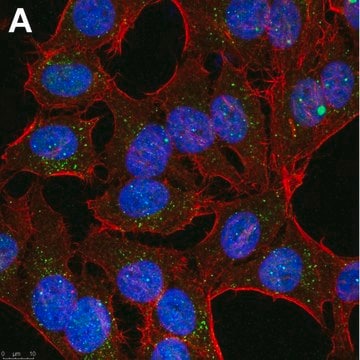ZRB1746
Anti-Peptide 2A Antibody, clone 2F13 ZooMAb® Rabbit Monoclonal

recombinant, expressed in HEK 293 cells
Synonym(s):
Genome Polyprotein-2A peptide
About This Item
WB
affinity binding assay
immunocytochemistry: suitable
western blot: suitable
Recommended Products
biological source
rabbit
Quality Level
recombinant
expressed in HEK 293 cells
conjugate
unconjugated
antibody form
purified antibody
antibody product type
primary antibodies
clone
2F13, recombinant monoclonal
description
recombinant, expressed in HEK 293 cells
product line
ZooMAb® learn more
form
lyophilized
mol wt
calculated mol wt 258.93 kDa
observed mol wt ~18 to 32 kDa
purified by
using Protein A
species reactivity
virus
species reactivity (predicted by homology)
all
packaging
antibody small pack of 25 μL
greener alternative product characteristics
Waste Prevention
Designing Safer Chemicals
Design for Energy Efficiency
Learn more about the Principles of Green Chemistry.
enhanced validation
recombinant expression
Learn more about Antibody Enhanced Validation
sustainability
Greener Alternative Product
technique(s)
affinity binding assay: suitable
immunocytochemistry: suitable
western blot: suitable
isotype
IgG
epitope sequence
Internal
Protein ID accession no.
UniProt accession no.
greener alternative category
shipped in
ambient
storage temp.
2-8°C
target post-translational modification
unmodified
Gene Information
bacterial ... LacZ(945006)
General description
Specificity
Immunogen
Application
Evaluated by Western Blotting in lysate from HEK293T cells transfected with CD3 , , and chains.
Western Blotting Analysis (WB): A 1:1,000 dilution of this antibody detected 2A in lysate from HEK293T cells transfected with CD3 , , and chains.
Tested applications
Affinity Binding Assay: A representative lot of this antibody bound Peptide 2A with a KD of 7.2 x 10-8 in an affinity binding assay.
Immunocytochemistry Analysis: A 1:100 dilution from a representative lot detected Peptide 2A in HeLa cells transiently transfected with a plasmid expressing Cas9-Peptide 2A-RFP from a CMV promoter.
Note: Actual optimal working dilutions must be determined by end user as specimens, and experimental conditions may vary with the end user
Evaluated by Western Blotting in lysate from HEK293T cells transfected with CD3 , , and chains.
Western Blotting Analysis (WB): A 1:1,000 dilution of this antibody detected 2A in lysate from HEK293T cells transfected with CD3 , , and chains.
Target description
Physical form
Reconstitution
Storage and Stability
Legal Information
Disclaimer
Not finding the right product?
Try our Product Selector Tool.
Storage Class Code
11 - Combustible Solids
WGK
WGK 1
Flash Point(F)
Not applicable
Flash Point(C)
Not applicable
Choose from one of the most recent versions:
Already Own This Product?
Find documentation for the products that you have recently purchased in the Document Library.
Our team of scientists has experience in all areas of research including Life Science, Material Science, Chemical Synthesis, Chromatography, Analytical and many others.
Contact Technical Service








